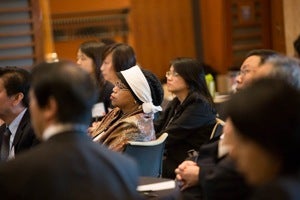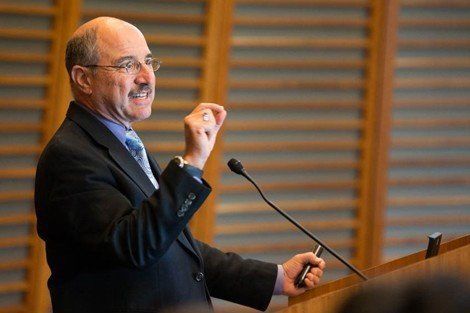September 5, 2014 — Flashed on screen at a recent Harvard symposium was an illustration from the year 1308 showing students in a lecture-style class. Some are fooling around. Some look bored. One is even sleeping.
Next on screen: a modern-day photo of a lecture-style class, surprisingly similar to the 1308 illustration. The professor is at a lectern—and the students, sitting in rows before him, look just as bored as their medieval counterparts.
The images were presented during a series of talks on innovations in education at the 9th Teikyo-HSPH Symposium, on “Training Public Health Leaders for the 21st century,” held Thursday, Sept. 4 at the Harvard Medical School’s Joseph B. Martin Conference Center. The symposium, held every two years, is jointly sponsored by Harvard School of Public Health (HSPH) and Teikyo University Graduate School of Public Health in Japan.
Sanjay Sarma, MIT’s director of digital learning, showed the two lecture hall images to make the point that while other industries—publishing, retail, and music, for instance—have undergone seismic changes because of new technologies, “nothing much has changed” with Western-style education.

Speakers at the daylong event came from HSPH, other parts of Harvard, Teikyo University, and universities in the United Kingdom, Indonesia, the Philippines, and Thailand. Topics included a wide range of teaching ideas—from experiential learning to “flipped” classrooms to leadership training—that could improve public health education in the years to come.
Time for “deep reflection”
Opening the symposium, HSPH Dean Julio Frenk said the time is ripe for “deep reflection” on how to improve education for health professionals because of new trends: advances in understanding how people learn; growing global demand for lifelong health education; and technological advances that have created new platforms for educational innovation. He offered an overview of HSPH efforts to redesign its educational strategy, such as by combining onsite learning and online learning and emphasizing training in areas such as leadership and communication.
Reimagining education—at HSPH and beyond
Other HSPH speakers included Peter Berman and Ian Lapp. Berman, faculty director of the School’s new DrPH program, discussed the program’s aim to prepare graduates to be leaders in the health sector through a unique mix of classroom training and real-world experience. Lapp, associate dean for strategic educational initiatives, spoke about the process of reimagining education at HSPH, which began in fall 2010 and is ongoing. He discussed the intensive work conducted by faculty and administrators at HSPH, who tackled questions such as “If we could start ‘de novo,’ what would be the best way to structure education?” and “What role does e-learning play in improving learning outcomes and extending the reach of our programs?”
Mariko Inoue, an associate professor at Teikyo University, spoke about that school’s efforts in creating Japan’s first DrPH program, which began in April 2014. Representatives from three other Asian universities participated in a panel discussion on challenges faced by Asian schools of public health.
Other speakers included keynoter Eric Mazur, Balkanski Professor of Physics and Applied Physics at Harvard University; Samuel Molton, director of educational research and assessment at the Harvard Initiative for Learning and Teaching; and Lincoln Chen, president of the China Medical Board and former HSPH Taro Takemi Professor and director of Harvard’s Center for Population and Development Studies.
photos: Emily Cuccarese
